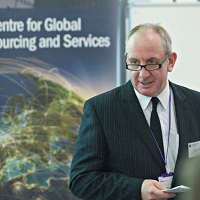Following yesterday’s article looking at the future role of shared services in higher education, Andrew Rothwell and Ian Herbert of Loughborough Universities’ Centre for Global Sourcing and Services highlight how digital relationships and offshoring will transform universities – and possibly secure their survival.
Some north American and Australian correspondents have predicted the demise of many institutions due to institutional mergers and changing demand patterns, with widespread redundancy of academic and professional support staff as a result. Others predict the rise of the ‘high-brand’ global university, with superstar academics delivering masterclass-style lectures to tens of thousands of remote students, simultaneously – and with the potential for each to rewind and review. After all, who wouldn’t want to be taught retail management by the ‘Queen of Shops’, or innovation by James Dyson?
A more measured view from a 2013 IPPR report asks – why should universities be immune to the kind of changes that have already transformed business and some other public organisations through the forces of technology and globalisation?
We support this view. In our lifetimes, indeed, in the last three decades, we have seen the virtual disappearance of much of the UK automobile and motorcycle industries – where are they now? Could this happen to UK universities? Based on our case organisations, and more recent insights from key informants in the higher education sector, we offer some predictions of our own.
First, it seems crazy that the dominant model of teaching in many subject areas remains the traditional lecture, just as it has been for decades. Digitally connected students may well expect lectures to delivered by global leaders in their respective field, directly to their hand-held devices, or, as one of our key informants suggested maybe “harness the learning from innovation in computer games”. At the same time, they value tutor contact, and can seem surprisingly dependent – does this have to be face-to-face?
Offshoring
Second, we predict the extensive offshoring of student support and registry functions, whether though ‘captive’ shared service centres or third party organisations. Again, as one of our respondents suggested, the cloud is administered outside the UK anyway – offshoring by another name. Third, we predict much greater use of automation, whether this be through self-service in student administration processes or the re-engineering of back-office processes.
The great questions for us are not so much about the managerial, globalisation and technology factors – these are well-known, inevitable and relentless. The real issue is what will happen to student learning? Indeed, what will students expect and how will institutions deliver against those expectations?
So while we can confidently expect universities to adopt many business innovations to complement their own unique take on shared services and outsourcing, it is the academic domain where we believe the biggest changes will take place. Most universities haven’t begun to harness the power of digital innovation in this respect, and most of their staff may be ill-equipped to do so.
Finally we need to focus on our students. What is their psychological contract? Is what we offer actually worth getting into debt for? Will international students continue to see the UK as a destination of choice? To summarise, UK universities have achieved remarkable things in the last decade. The next two decades will, we believe see a complete transformation of the sector. Let us hope it is one that we can manage, and master.
Read the first part of these twinned posts – Are we really competing? Should we be collaborating?
Ian Herbert and Dr Andrew Rothwell are based at The School of Business and Economics, Loughborough University. Their longitudinal research on shared services has been supported by the Charitable and General Trust of the Chartered Institute of Management Accountants and Universities UK. Further details at www.shared-services-research.com
The Loughborough SSC project will be holding the next meeting of its successful roundtable series at the SSC of Lloyds of London, Bracknell, on 14th October 2015. For further details please email ssc-research-team@lboro.ac.uk








